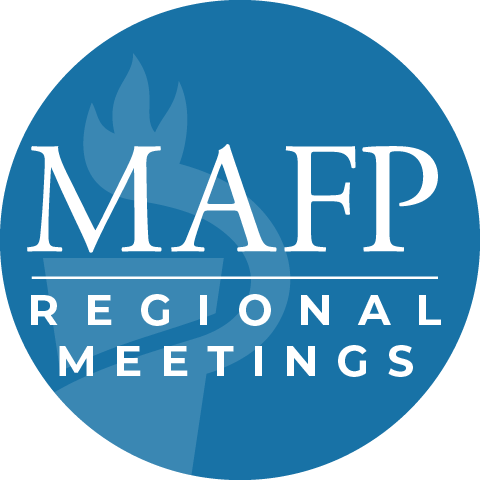The Minnesota Academy of Family Physicians (MAFP) has an Intro to Advocacy workshop for family physician, resident physician and medical student members to help equip them to advocate effectively for patients and family medicine. As part of the workshop, in 2023, the MAFP created five online modules to support members as they advocate across different mediums and settings.
Preparing for Legislative Visits
Video: Preparing for Legislative Visits
Tips for Preparing for Legislative Visits:
- Know your ask.
- Prepare a story.
- Gather facts and data.
- Be OK not knowing an answer.
- Respect your legislators’ time.
- Learn about your legislator (before meeting).
- Thank your legislator (after meeting).
Know Your Ask:
- Know why you are holding the meeting. Do you want the legislator to vote a certain way on an issue, get familiar with an issue and/or get to know you as a resource? Get as clear as possible on your ask.
- Be up front with the reason for the meeting.
Prepare a Story:
- Stories are powerful and can change hearts and minds. Is there a story that explains and personifies your issue?
Gather Facts and Data:
- Be ready to back up any story you share with facts and data.
Be OK Not Knowing an Answer:
- It’s OK to not know the answer to a question.
- If you don’t know an answer, tell your legislator that you’ll get back to them and then be sure to follow up
after the meeting.
Respect Your Legislators’ Time:
- Legislators are busy. Begin by asking them how much time they have to chat.
- Make good use of your time together.
Learn About Your Legislator (Before Meeting):
- Which political party are they affiliated with?
- Which legislative committees are they part of?
- Do they have policy issues they are passionate about?
Thank Your Legislator (After Meeting):
- Thank your legislator for work that you appreciate.
- Offer to be a resource. Most legislators are not experts on health care.
Additional Resources to Prepare for Legislative Visits
- Online Advocacy Course: State and Local Advocacy (Society of Teachers of Family Medicine)
- Lobbying 101 (American Academy of Family Physicians)
- Contacting Your Legislator (Minnesota Medical Association)
- Find Out Who Represents Me (Minnesota Legislature)
Getting an Op-Ed Published
Video: Tips for Getting an Op-Ed Published
Tips for Getting an Op-Ed Published
- Choose the right publication.
- Check submission guidelines.
- Make a connection.
- State your case.
- Follow up and share.
Choose the Right Publication:
- When choosing a publication, think geography, topic and timeliness. Where will your message go? Is it relevant and timely for the audience/readership?
- Read a publication before you pitch to it.
Check Submission Guidelines:
- Check the publication guidelines for word-count and instructions on how to submit.
- Structure your op-ed as follows: 1. anecdote, 2. problem, 3. solution, 4. call to action and 5. a tie back to the anecdote.
Make a Connection:
- Tell a story and/or relate the issue to a recent event or something local.
- Communicate a clear, unique point of view.
- Hook readers with your main point.
State Your Case:
- Utilize data and stories.
- Offer specific recommendations.
- Acknowledge the opposition.
- Appeal to your authority and expertise.
Follow Up and Share:
- After publication, share across social media, with your legislators, with communications contacts at your clinic/health system and physician groups like the MAFP and with your networks.
- If your submission is rejected, ask if you can submit it as a letter to the editor or try a different publication.
Additional Resources for Getting an Op-Ed Published
- How to Write an Op-Ed (Society of Teachers of Family Medicine)
- Letter to the Editor template (Berkely Media)
Using Social Media for Advocacy
Video: Using Social Media for Advocacy
Tips for Using Social Media for Advocacy
- Find out who represents you.
- Follow your legislators.
- Track issues and engage.
- Use relevant hashtags.
Find Out Who Represents You:
- Search “Who Represents Me MN” online or use the “Who Represents Me” tool from the MN Legislature.
Follow Your Legislators:
- Follow your legislators across platforms.
- Study the kinds of posts they respond to.
- Engage consistently (be sure to add your district in posts/messages to legislators to show you are their constituent).
- Let legislators know that you appreciate their time do what you can to build a relationship.
- Thank them on social media after an interaction and after they vote your way on an issue.
Track Issues and Engage:
- Be aware of conversations happening online around your issue, and join in.
- Connect with other physicians on social media.
- Use social media as a tool for educating the public.
Use Relevant Hashtags:
- Hashtags can increase your post visibility.
- Recommended hashtags to use: #mnleg (Minnesota Legislature) and #mafpadvocacy (MAFP Advocacy).
- Tip: Look at posts from other physicians/organizations advocating on your issue to know other relevant hashtag(s) to use.
Additional Resources for Using Social Media for Advocacy
- Social Media for Doctors: Taking Professional and Patient Engagement to the Next Level (Family Practice Management, American Academy of Family Physicians)
- How to Engage Members of Congress on Social Media
- Find Out Who Represents Me (Minnesota Legislature)
- Follow the MAFP on Social Media
Making an Advocacy Action Plan
Video: Making an Advocacy Action Plan
Tips for Making an Advocacy Action Plan
- Organize your thoughts and identify next steps.
- Engage in advocacy at your own pace.
- Know your “ask.”
- Understand the other side.
Organize Your Thoughts and Identify Next Steps:
- Putting your thoughts in a document may help. Download the Advocacy Plan Worksheet: bit.ly/advocacyactionplan.
- Things to consider: The issue. What is your story? What are the facts? Identify assets and liabilities. Who are the decision-makers? Whose voices should be at the table? Who stands to lose, and who stands to gain? What are your short- and long-term goals? What will success look like?
Engage in Advocacy at Your Own Pace:
- Connect to the work that is already happening.
- Find partners.
- Ask how you can be most helpful as a physician voice.
Know Your “Ask”:
Prior to engaging with an issue:- Get as clear as possible on your “ask.”
- Think through the stories and facts/data that you will use to support your “ask.”
Understand the Other Side:
Strengthen the argument by asking yourself:- Who is on the other side?
- What is their argument?
- What info will you need to counter their argument?
Additional Resources for Making an Advocacy Action Plan
Guiding the Work of the MAFP with a Resolution
Video: Setting MAFP Policy/Direction via Resolutions
Things to Know About Setting MAFP Policy
- Resolutions guide our work.
- Every member can have a voice.
- Online resources and staff support are available.
Resolutions Guide Our Work:
- Resolutions are written motions to suggest a specific policy/direction.
- Resolutions come from members, who can author, deliberate and/or vote.
Every Member Can Have a Voice:
- Any MAFP member can submit a resolution.
- All MAFP members are invited to submit comments and deliberate on resolutions prior to voting.
Online Resources and Staff Support Are Available:
Things to Know About Writing Resolutions
- Begin with “Whereas” clauses to explain the issue/concern.
- Use “Be it resolved” clauses to outline the “ask” or “asks.”
- Access writing tips and tools.
Begin With “Whereas” Clauses to Explain the Issue/Concern:
- An example: Whereas Minnesota has some of the greatest health disparities in the country… See a full example.
Use “Be It Resolved” Clauses to Outline the “Ask” or “Asks:”
- An example: Be it resolved that the MAFP provide continuing medical education addressing health disparities… See a full example.
Access Writing Tips and Tools Online:
Take Action: Write a ResolutionAdditional Resources for Setting MAFP Policy/Direction via Resolution
- Resolution Forum (formerly House of Delegates)
- Take Action: Write a Resolution
- Submit a Resolution
- The Resolution Process
- View Resolutions
RELATED PAGES
Advocacy Blog
MAFP recaps the 2025 Minnesota legislative session and ongoing budget talks....
AAFP and MAFP advocate for you by championing policies that improve your...
MAFP forms a task force to identify interpreter access gaps and support...
UPCOMING EVENTS
Tuesday, June 10, 2025
7:00 - 8:00 pm


